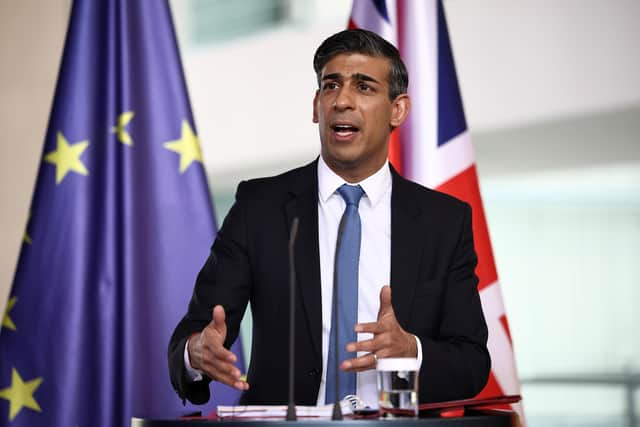SNP say defence spending increase means 'freezing or cutting' other UK government departments
The SNP have warned the UK government’s promise to increase defence spending means the budgets for other Whitehall departments will now be cut or frozen.
Rishi Sunak has committed to reaching 2.5 per cent of gross domestic product (GDP) by 2030, and spending an extra £75 billion more on defence over the next six years compared with existing levels.However, SNP defence spokesperson Martin Docherty-Hughes has now claimed the plans are not costed and will leave funding “black holes” in a host of other areas.
Advertisement
Hide AdAdvertisement
Hide AdWhile supporting an increase, the West Dunbartonshire MP argued there was no plan and accused the Prime Minister of blatant “electioneering”.


He said: “It’s a smoke and mirrors, that will leave black holes right across a range of other budget headings. It’s a cannibalisation of the current budgets, which is why the Secretary of State would not answer my question today on whether that cannibalisation will continue. We won’t get an understanding of what’s being spent on defence until they’re separate.
“If we talk about flat spend, in real terms, getting into the minutia of it all, if there’s no borrowing and no debt, where is it coming from – behind the couch? I thought there was no magic money tree. It means freezing or cutting other budgets in Whitehall.
“There can’t be a real plan because it wasn’t in his budget. If there was, the Office for Budget Responsibility would have got across it and said it’s ‘pie in the sky’. It’s electioneering, it’s keeping his backbenchers kind of happy. How does this impact the front line? Where do they fit in this?
"It’s a delusional fantasy with no foundation in the real world. The so-called £4 billion investment under that heading, that’s not going to deal with that. He doesn’t say how they’re going to change the culture in the armed forces that is driving people away and driving people out.”
Mr Docherty-Hughes pointed to recent funding increases in Australia, carried out with an investment programme.
He said: "You don’t see any of that from the UK government and I doubt you’d see any of that from an incoming Labour Government. They’ll look at the books and be absolutely terrified. They [the Tories] are wanting [Sir Keir] Starmer to inherit all their bad choices.
“It’s going to be draconian. Of course you want to invest in Scotland, but you want to invest in capability. They go on about GDP, but it’s one thing to say they’re going to spend all this money, it’s another to actually specify what they’re going to spend it on.”
Advertisement
Hide AdAdvertisement
Hide AdHis comments came just hours after the Prime Minister declined to rule out cuts to other spending areas outside the NHS and schools, defending his pledge as “fully funded”. The commitment will be funded by slashing 72,000 civil service jobs, but economists have warned it will also require deep cuts in other areas of public spending.
Asked at a press conference on Wednesday in Berlin whether his defence increase will mean tax rises and deep cuts, Mr Sunak said that was “not a fair characterisation”.
“The plan that I announced yesterday is fully funded,” he said. “It’s funded rightly by a reduction in the civil service headcount back to 2019 levels … combined with an uplift in R&D spending.
“But you’re right. We are making a choice to prioritise defence. I think that’s the right thing because, whether we like it or not, the world is more dangerous than at any moment since the Cold War.”
Pressed to rule out further cuts, the Prime Minister said: “We have record investment in our public services, including the NHS – that’s not going to change, it’s going to continue.
“We have record investment in our schools – that’s not going to change, it’s going to continue to increase. And alongside that we are able to cut people’s taxes.”
Without mentioning spending in other areas outside health and education, Mr Sunak added: “I am not going to get into writing the next manifesto here and now, but what I am confident about is that if you have a strong plan for the economy as we have, and that plan is working. We stick to that plan, we will be able to continue increasing defence spending.
“It is a completely funded plan. We have got a very clear idea of how to reduce civil service headcount, which has grown considerably over the last few years, and we can bring that back and use that to fund what I announced yesterday. Alongside that, [we] continue to invest in public services and cut people’s taxes.”
Advertisement
Hide AdAdvertisement
Hide AdThe Institute for Fiscal Studies (IFS) said unprotected areas of public spending would now face cuts of around 4 per cent a year after 2025 to help meet the defence commitment.
Downing Street said the plan would cost £4.5 billion in 2028/29, of which £2.9bn would come from savings due to the reduction in the size of the civil service, with £1.6bn coming from the research and development budget.
Labour’s shadow defence secretary John Healey accused the UK government of producing a “fake figure” of £75bn.
He said: “They’ve tried this trick before. In the 2015 defence review, ministers pledged to cut 30 per cent of the MoD [Ministry of Defence] civil servants to make their defence spending plans add up.
“Civil servant numbers didn’t go down, they went up. Not down to 41,000, but up to 63,000.”
Labour has said it would conduct a strategic defence and security review in its first year in office to understand the resources required to meet the threats facing the UK, but has also committed to a 2.5 per cent target when finances allow.
Comments
Want to join the conversation? Please or to comment on this article.
